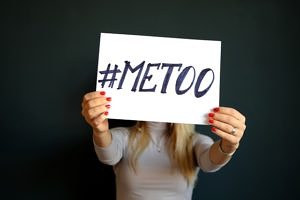
I am writing this on the day of the Alabama Senate Race between Roy Moore and Doug Jones. I have no idea if Moore will be elected to the Senate, even as the claims of sexual misconduct against him continue to gather steam.
I have been nervous all day. Anxious. Stomach in knots and short of breath, especially as the sun goes down. Because soon we will have an answer. Whether this will be another night of broken faith in humanity like the 2016 election, or if there will be a shred of hope in the decency of human beings and the validity of sexual abuse and assault allegations.
For survivors of sexual abuse and assault like me, this is a particularly triggering time. A laundry list of men have been accused of sexual misconduct and have stepped down from their positions of importance and relevance. As a survivor who never got her justice, this is highly satisfying. As an advocate for victims of sexual assault, this is an amazing time.
As a person with trauma-induced Post Traumatic Stress Disorder, I basically feel like throwing up. I’ve got all the feels: anger, rage, worry, sadness, disbelief – the list goes on. And there’s no avoiding the topic, no matter where I go.
I decided that I wanted to manage my triggers during this time but still be able to have conversations with people as the topic comes up. Because no matter what happens specifically with Roy Moore, accusers are continuing to come forward and be attacked by the media and the court of public opinion. Here are a few suggestions to help navigate these conversations about sexual misconduct.
[Tweet “Sexual abuse and assault is a community and cultural problem.”]
What People May Say About Sexual Misconduct
I hear a lot of skepticism and questions about women who are coming forward with accusations of sexual misconduct. Some of them include:
-

Photo by Adi Goldstein on Unsplash “So much time has gone by, it doesn’t even matter anymore.”
- “They just want money.”
- “All these women are just jumping on the bandwagon.”
- “Why didn’t they report it when it happened?”
- “I wouldn’t have put up with it. I would have done x-y-z.”
These are in conjunction with other common statements and questions, like “I wonder what she was wearing,” and “She was probably a heavy drinker,” and “I bet she wanted it.” Which is all victim blaming and in some respects indicates a measure of fear. Sexual abuse and assault is a community and cultural problem.
These kinds of statements and questions may surprise you and – if you have PTSD – send you right down Trigger Alley. If that’s the case, take care of yourself. That is the most important priority.
Keep Sexual Misconduct Personal
 However, if you’re able to share your story of sexual abuse and assault, this is a pretty good time. There is no better spokesperson for the realities of trauma, sexual assault, and PTSD than those of us who have been through it.
However, if you’re able to share your story of sexual abuse and assault, this is a pretty good time. There is no better spokesperson for the realities of trauma, sexual assault, and PTSD than those of us who have been through it.
One of my recent conversations started with the other person saying some of the statements that I outlined above. I was tempted to stay silent, to not rock the boat. Then I reminded myself that I am not that person anymore, and I said, “Well, that’s not the way trauma works.”
“What do you mean?” they said.
“For example, it took me years to tell somebody that my dad sexually abused me,” I said. “For many years, I simply shoved down the memories and feelings and refused to look at them. I was a teenager at the time of my abuse, and wasn’t able to pursue any criminal or civil action. But now? I would totally take him to court, and my sexual abuse happened 30 years ago.”
The fact is, there are many reasons why sexual abuse survivors wait to tell their stories or simply decide never to talk about it. Ironically, this is in large part with how people respond.
Be prepared for awkward silence or a change of subject. The other person may continue to argue. This is a good time to be prepared with facts.
Keep Sexual Misconduct Factual
During a different conversation that I had about sexual misconduct, the other person followed up with versions of, “They’re lying and just want money,” and “I wouldn’t have put up with it.”
In What if Allegations of Sexual Assault are False?, I talk about how there are no advantages to the survivor for disclosing incidents of sexual abuse and assault. Based on evidence, only between two and eight percent of reports of sexual misconduct are false. Perpetrators also groom their victims over time, making it difficult for victims of sexual abuse and assault to get away.
Here are additional helpful facts to memorize:
- More than 90 percent of child sexual abuse victims know their attacker (Center for Family Justice); children are groomed over time to keep the abuse secret.
- 1 in 6 boys and 1 in 4 girls are sexually abused before the age of 18. (NSOPW)
- “Disclosure of sexual abuse is often delayed; children often avoid telling because they are either afraid of a negative reaction from their parents or of being harmed by the abuser. As such, they often delay disclosure until adulthood.” (NSOPW)
- More than 40 percent of children who are abused show no symptoms (NSOPW)
- Only 28 percent of victims report their sexual assault to the police (Bureau of Justice Statistics, Center for Family Justice)
- Between 70 and 90 percent of women who experience sexual misconduct in the workplace do not report it. (NWLC)
- Women do not report sexual misconduct due to fear of losing their jobs, fear of not being believed, belief that nothing will be done and therefore will make the situation worse, and shame and embarrassment. (NWLC)
- Employers are held responsible for sexual harassment in their workplaces. Accusers must prove their cases of sexual misconduct. Then they are eligible to receive monetary compensation. (NWLC)
Sexual misconduct in our mainstream culture is not going to go away anytime soon, and reaches the highest levels of the media, corporations, and government entities. Those of us who have survived sexual abuse and assault are in a unique position to help educate and break through the associated stigma in whatever ways we can.